Time-travelling through London and Tehran

Bookshops serve more than just a place for bibliophiles to hang around, browse, and buy books. In the two recent novels I read, the bookshops featured are also hotbeds of budding romance, mystery, betrayal, heartbreak, political, and espionage intrigue. Louise Fein's The London Bookshop Affair (William Morrow, 2024) and Marjan Kamali's The Stationery Shop of Tehran (Gallery Books, 2019) took me time-travelling to two vastly different countries and continents troubled by wars and political upheavals. The backdrop of the former is the Cuban Missile Crisis, and that of the latter is the pro-Mossadegh and anti-Shah uprising. I was struck by the similarities and differences between these two books, especially when certain stereotypes about the cultural and social mores of the two countries were lodged in my brain.
The stationery shop in Tehran is prominently located across from a high school, and it stocks poetry volumes by the local favourites, Rumi and Saadi, and foreign literature translated to Persian to quench the thirst of the Iranian youth in the 1950s. The well-lit and quiet store is the gateway to modern Iran, where tomes of western literature are available to book lovers and help young men and women broaden their intellectual horizons. The London bookshop, H.J. Potts, is in the commercial part of Strand, a treasure trove of antiquarian books boasting the likes of James Joyce, Virginia Woolf, Mary Shelley, and Lord Byron; it hides between shops selling bespoke business suits and barristers' gowns and related items. It is a dark and brooding shop with stacks of books from the floor to the ceiling, smelling of "dust, leather, and beeswax." Incidentally, both the shops are the key distribution points of state secrets and forbidden literature. Mrs. Denton is the owner of the London bookshop, frequently visited by a string of secret service agents. Mr. Fakhri owns the stationery shop, where he hides pro-democratic and anti-Shah pamphlets.
A teenage girl occupies, respectively, the centre stage of both works—19-year-old Celia in The London Bookshop Affair and 17-year-old Roya in The Stationery Shop of Tehran. Although worlds apart, the main timeline in the stories is close to each other—London in the 1960s and Tehran in the 1950s. While Celia dreams of being a career woman and is trying to break away from her conservative working-class parents with rigid rules and outlook on life, Roya is in high school and her liberal parents, especially her father who is a government clerk, encourage her to choose a life of education and become a scientist. It's noteworthy how "arguing back is frowned upon" in Celia's household, whereas Roya has a friendly relationship with her parents where there is seldom room for disagreements.
Both Roya and Celia are strong characters with the ambition to stand on their feet; Roya is driven by an encouraging father and Celia by the lack of one. They are aware of the political environment in their respective countries and actively take part in bringing change. There are incidents of demonstrations against nuclear disarmament in London and student uprisings against the Shah in Tehran. Once again, we are reminded how youth take the lead in bringing about major changes in the political landscape. It was eerie that as I was reading The Stationery Shop of Tehran on July 17, 2024, my own country was witnessing similarly strong upheavals by the university students demonstrating on the streets and looking death squarely in the eye.
For Celia, H.J. Potts is a place where she works and earns a bit of money. It's also a refuge from the constricting home where her middle-aged parents are always nagging her about marriage and how a woman should conduct herself. Besides, she loves reading and doesn't mind spending hours in the bookshop marvelling at the first-edition books before they are sent for auction. On top of that, Mrs. Denton gives Celia a raise, which she uses prudently to enrol in a secretarial course. Roya is as avid a reader as Celia, and her favourite place in the world is the stationery shop, where she gets her fill of poetry by Rumi and Saadi. She also loves to flip through the smooth pages in a notebook, the smell of the lead pencils, and the sight of fountain pens and inkwells.
The Stationery Shop of Tehran shows the family ties and bonding between the parents and the two teenage daughters. They love spending time together and the girls join their mother and their help in cooking elaborate Persian dishes full of rich and warm flavours and colours. The parents hardly have any arguments. In sharp contrast, Celia's meals are hurriedly put together with bacon-and-eggs or a steak-and-kidney pudding that her mother slaps on the table. Her parents hardly agree on anything and show no signs of affection. However, the reasons are later revealed through their backstory.
The depiction of London and Tehran helps the reader visualise the two cities and their culture. The drab and drizzling London with people wearing dark suits and carrying black umbrellas are in direct contrast to the flowery, sunlit Tehran. The thunderstorms and rains are palpable in The London Bookshop Affair and lend a fitting landscape to the dark secrets Celia finds out about her mother. The budding love between Roya and Bahman is in perfect harmony with the scent of jasmine in the air and the trees and branches bursting with fresh green foliage in the Tehran summer. The descriptions of Nowruz or New Year in Iran portray a time of happiness, cooking, sharing, and exchanging gifts; people dress up in new clothes and visit their relatives. Persian dishes symbolise nostalgia, love, and bonding throughout the novel. Celia, on the other hand, has only her best friend, Daphne, and her childhood friend, Sam, besides her parents. She is conscious about her well-worn clothes and can hardly afford to buy new ones. She is discouraged from having any affairs of the heart and cannot imagine bringing a man home. Meanwhile, in 1950s Tehran, Roya and her sister are allowed to have mixed get-togethers at home with their college friends and cousins.
The stationery and the bookshop are where Celia and Roya meet their love interests. The bell at these shops announces the entrance of Bahman and Septimus. The door of the stationery shop brings in more than a gust of wind; it ushers Bahman into Roya's life, but unfortunately, she loses him also because of this place. The sound of such a bell in another stationery shop in another time and place finally finds Roya in a full circle, her questions answered, and her doubts quelled. Similarly, when the bell jangles at H.J. Potts and brings the suave Septimus into Celia's life, she is swept off her feet without having any idea of how closely he is related to the bookshop. Eventually, she loses him through unfortunate circumstances. These incidents help shape both Celia and Roya as they manage to put the past behind and make a life for themselves. Their resilience and strength of character help them soldier on through a life wrought with losses and secrets.
The London Bookshop Affair and The Stationery Shop of Tehran are veritable time-travel portals. They offer a deep look at the political mishaps of the times, and as we witness similar incidents around the world, we can easily relate to them. We get a taste of the cultural and social norms of the two countries and how these can take a progressive or regressive turn. It is ironic how Roya's middle-class family is so liberal in the 1950s Tehran whereas Celia's is so conservative in the 1960s London. Furthermore, it was a pleasure travelling through the streets and squares of London and Tehran, being swayed by the tango of Roya and Bahman or bathed in the candlelight warmth while Celia and Septimus dined at an upscale French bistro in Mayfair. Both the novels put bookshops at the heart of their narratives, from where social, political, and romantic nodes grow and connect far-flung continents, cultures, and peoples.
Zertab Quaderi is a freelance English content writer and social media marketing consultant. In her free time, she does quick pen and wash urban sketches and watercolour painting.

 For all latest news, follow The Daily Star's Google News channel.
For all latest news, follow The Daily Star's Google News channel. 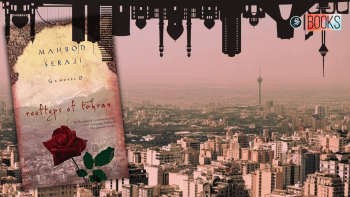
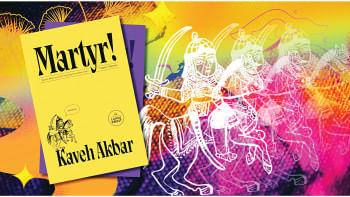





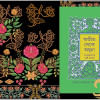
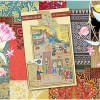
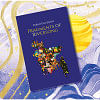


Comments